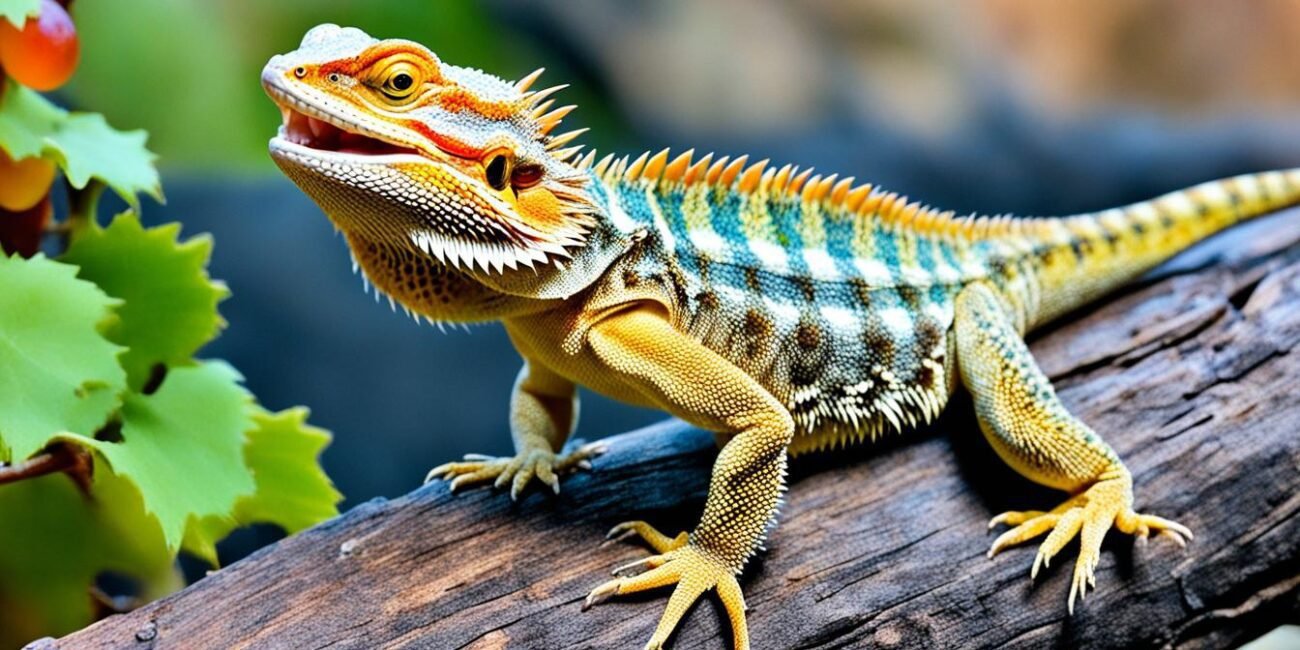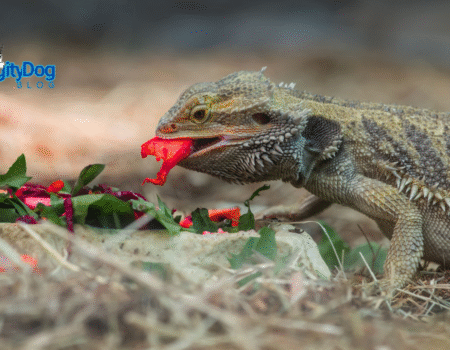“Let food be thy medicine and medicine be thy food.” – Hippocrates
If you’re a proud bearded dragon owner, you know that providing a nutritious and well-balanced diet is essential for their health and well-being. While bearded dragons primarily thrive on a diet of insects and vegetables, you may wonder if they can enjoy the occasional sweet treat, such as grapes.
Grapes are a delicious and popular fruit that humans enjoy, but are they safe for our scaly companions? In this article, we will delve into the topic of bearded dragons and grapes, exploring whether these fruits can be a part of their diet or if caution is warranted. Let’s unlock the secrets and uncover the truth about bearded dragons and grapes.
Key Takeaways:
- Grapes can be offered to bearded dragons as a treat, but not as a regular part of their diet.
- It is important to consider the health of the dragon, avoid feeding them grapes with seeds, and be mindful of the risks of overhydration and the impact of grapes on calcium levels.
- Bearded dragons can safely consume grapes of any color, including green, purple, and red.
- Limiting grape consumption is crucial to prevent choking hazards, overhydration, and potential interference with calcium absorption.
- Grape leaves are more nutritious for bearded dragons than the fruit itself and can be included in their diet.
How Often Can Bearded Dragons Have Grapes?
When it comes to feeding grapes to bearded dragons, the frequency of consumption largely depends on their overall health. For healthy dragons, enjoying one or two grapes once a week is generally safe and won’t pose any significant risks. However, if your dragon has underlying health concerns or conditions, it is advisable to limit grape consumption to once a month or consult a reptile veterinarian for guidance.
Monitoring your dragon’s weight is crucial to ensure they maintain a healthy balance. Just like humans, bearded dragons can also be susceptible to obesity and diabetes, so it’s important to be mindful of their grape intake. Even in small portions, grapes can affect their sugar levels and overall well-being.
Remember:
Always prioritize your bearded dragon’s health by closely monitoring their diet and consulting with a reptile veterinarian if you have any concerns about grape consumption or their overall nutrition.
Guidelines for Feeding Grapes to Bearded Dragons
If you decide to include grapes in your bearded dragon’s diet, it’s crucial to follow some guidelines to ensure their safety and well-being. Here are a few key points to consider:
- Offer grapes as an occasional treat, not as a regular part of their daily diet.
- Choose seedless grapes to avoid any potential choking hazards.
- Always wash grapes thoroughly before offering them to your dragon.
- Consider the size of the grapes – smaller pieces are easier for them to consume and lessen the risk of choking.
- Remove the skin of grapes, especially for younger dragons, to aid digestion.
- Monitor your dragon’s response to grapes and ensure they tolerate them well, without any negative gastrointestinal effects.
- Observe your dragon’s weight, activity levels, and general health to ensure that grapes aren’t causing any adverse effects.
By following these guidelines and being attentive to your bearded dragon’s individual health needs, you can safely incorporate grapes into their diet as a tasty and occasional treat.
Now that you have an understanding of how often bearded dragons can have grapes and the guidelines for feeding them, you can confidently introduce this fruit into their diet while ensuring their overall well-being.
Different Colors of Grapes for Bearded Dragons
Bearded dragons can safely consume grapes of any color, including green, purple, and red.
The color of the grapes does not affect their suitability for bearded dragons’ consumption.
However, it is important to note any specific health concerns or dietary restrictions discussed with a vet before offering grapes to the dragon.
When it comes to including grapes in a bearded dragon’s diet, the color does not play a significant role. Whether green, purple, or red, all varieties of grapes are safe for consumption by bearded dragons. The nutritional value and potential risks associated with grapes are not dependent on their color.
Before introducing grapes or any new food into a bearded dragon’s diet, it is crucial to consider the dragon’s overall health and consult with a veterinarian to ensure it aligns with their specific needs and dietary restrictions.
Why Grapes Should Be Limited for Bearded Dragons
Grapes can be a tempting treat for bearded dragons, but it is important to understand the potential risks associated with feeding grapes to these reptiles. While grapes do offer some health benefits, their consumption should be limited due to several concerns.
Choking Hazard and Gut Impaction
One of the primary risks when it comes to feeding grapes to bearded dragons is the potential for choking and gut impaction. Grape seeds, if ingested, can pose a choking hazard and may also lead to blockages in their digestive system. This can result in discomfort, pain, and even severe health complications if not addressed promptly.
Overhydration and Dehydration
Another concern with excessive grape consumption is the risk of overhydration and dehydration. Grapes have a relatively high water content, which can lead to overhydration if consumed in large quantities. On the other hand, too much grape intake can also cause dehydration due to the diuretic properties of grapes. It is essential to maintain a proper balance of hydration for the well-being of your bearded dragon.
Interference with Calcium Absorption
Grapes contain oxalates and phosphorus, which can interfere with the absorption of calcium in bearded dragons. Calcium plays a crucial role in their bone health and overall development. If the intake of grapes is not moderated, it can potentially lead to metabolic bone disease, where the dragon’s bones become weak and brittle. This condition can have severe consequences for their long-term health.
High Sugar Content
While grapes offer some nutritional value, their high sugar content can pose risks to bearded dragons. Regular consumption of sugary foods like grapes can contribute to tooth decay, obesity, and even diabetes in these reptiles. It is important to prioritize a balanced diet to ensure their optimal health and well-being.
So, while the occasional grape can be a tasty treat for bearded dragons, it is essential to exercise moderation and consider the potential risks involved. To provide your dragon with a well-rounded diet, be sure to incorporate a variety of other fruits, vegetables, and protein sources alongside grapes.
| Potential Risks | Health Benefits |
|---|---|
|
|
|
Can Bearded Dragons Eat Grape Leaves?
Bearded dragons can consume grape leaves, which are actually more nutritious for them than the fruit itself. Grape leaves are high in protein and calcium and low in phosphorus, making them a beneficial addition to a bearded dragon’s diet. To serve grape leaves, they should be washed and chopped before being placed in the dragon’s food bowl.
Benefits of Grape Leaves for Bearded Dragons
Grape leaves offer several health benefits for bearded dragons:
- Protein: Grape leaves are rich in protein, which is an essential nutrient for bearded dragons’ growth and development.
- Calcium: The high calcium content in grape leaves helps strengthen the dragon’s bones and prevent the development of metabolic bone disease.
- Low Phosphorus: The low phosphorus levels in grape leaves are beneficial for bearded dragons, as high phosphorus levels can interfere with calcium absorption.
Given these nutritional advantages, incorporating grape leaves into your bearded dragon’s diet can contribute to their overall health and well-being.
Here’s a table summarizing the nutritional content of grape leaves:
| Nutrient | Amount per 100g |
|---|---|
| Protein | 2.4g |
| Calcium | 16mg |
| Phosphorus | 16mg |
Grape leaves are a great natural source of protein and calcium for bearded dragons. Including them in their diet can provide essential nutrients and support their overall health.
Feeding Grapes to Bearded Dragons
When it comes to feeding grapes to bearded dragons, there are a few considerations to keep in mind. While some owners choose to offer whole grapes, cutting them up into smaller pieces can make consumption easier and reduce the risk of choking. This is especially important for younger dragons, as their smaller size makes them more susceptible to choking hazards.
To ensure the safety of your dragon, it is recommended to remove any seeds and skin before feeding them grapes. The seeds can pose a choking risk, while the skin may be difficult for the dragon to digest. By removing these parts, you can minimize the potential for gastrointestinal issues and ensure a more enjoyable grape-eating experience for your pet.
Additionally, grapes can be used as a tool to encourage bearded dragons to eat their vegetables. By mixing small pieces of grapes with staple veggies like bell peppers, sweet potatoes, and kale, you can entice your dragon to try new foods and ensure a well-rounded diet. This strategy can be particularly helpful for picky eaters or if you’re trying to introduce a variety of nutritious foods into their meals.
Ensuring the proper diet for your bearded dragon is crucial for their overall health and well-being. While grapes can be a tasty treat, they should only be offered in moderation as part of a balanced diet. The majority of their diet should consist of insects and protein (approximately 70%) as well as greens and vegetables (approximately 30%). Including a variety of foods that meet their nutritional needs will help keep your bearded dragon happy and thriving.
Grapes as Part of an Ideal Diet for Bearded Dragons
Grapes can be a tasty addition to a bearded dragon’s diet, but it’s important to remember that they should only make up a small part of their overall nutrition. These omnivorous reptiles require a balanced diet that consists primarily of insects and protein, along with a variety of greens.
For optimum health, a bearded dragon’s diet should consist of approximately 70% insects/protein and 30% greens. This means that while grapes can be enjoyed as a treat, they should not be the main focus of their meals.
When it comes to protein sources, gut-loaded crickets, dubia roaches, and occasional treats like hornworms, waxworms, and butterworms are suitable options. These provide the essential protein that bearded dragons need to thrive.
“A balanced diet is crucial for the overall health and well-being of bearded dragons.”
In addition to protein, greens play a vital role in a bearded dragon’s diet. Staple greens and veggies such as collard greens, dandelion greens, turnip greens, butternut squash, acorn squash, and bell peppers provide essential nutrients like vitamins, minerals, and fiber.
Benefits of Grape Leaves for Bearded Dragons
Grape leaves can also be included in a bearded dragon’s diet due to their high protein and calcium content. These leaves are more nutritious than the grapes themselves and can provide additional nutritional value to their meals.
To serve grape leaves, simply wash and chop them before placing them in the dragon’s food bowl. This provides an enriching and tasty addition to their diet.
Remember, maintaining a varied and balanced diet is essential for the health and well-being of your bearded dragon. Grapes should only be given as an occasional treat, while the majority of their nutrition should come from protein-rich insects and nutrient-dense greens.
| Food Group | Recommended Percentage |
|---|---|
| Insects/Protein | 70% |
| Greens/Veggies | 30% |
| Grapes | Occasional Treat |
Fruits to Avoid for Bearded Dragons
While it’s true that fruits are generally healthy for bearded dragons, there are certain fruits that should be avoided or limited in their diet. These fruits can have negative effects on their health and well-being. Let’s take a look at some fruits to be cautious about when feeding your bearded dragon:
- Spinach: Although spinach is packed with nutrients, it is also high in oxalates. These oxalates can bind with calcium and hinder the absorption of this vital mineral, leading to calcium deficiency.
- Broccoli: Broccoli also contains high levels of oxalates and should be fed sparingly to bearded dragons for the same reasons as spinach.
- Citrus fruits: Citrus fruits like lemons, oranges, and grapefruits are acidic and can cause digestive issues in bearded dragons. Their high vitamin C content may seem beneficial, but it’s recommended to avoid feeding these fruits to your dragon.
- Avocado: Avocado is toxic to bearded dragons and should never be included in their diet. It contains a substance called persin, which can be harmful and even fatal to these reptiles.
- Lettuce: While lettuce may seem like a harmless leafy green, it offers little nutritional value and can cause digestive problems such as diarrhea in bearded dragons. It’s best to choose other, more nutritious greens for their diet.
When it comes to feeding your bearded dragon, it’s important to choose fruits and vegetables wisely. By avoiding or limiting the fruits mentioned above and focusing on a balanced diet, you can ensure your dragon’s optimal health and well-being.
Bearded Dragons’ Response to Grapes
The response of bearded dragons to grapes may vary. Some dragons may enjoy grapes and eagerly eat them, while others may show little interest. It is important to observe the dragon’s behavior and preferences. However, caution should be exercised regarding the stickiness of grapes due to viv heat and the high sugar content that may not be beneficial for the dragon’s health.
For some bearded dragons, grapes can be an irresistible treat that adds variety to their diet. They may show excitement and actively seek out grapes when offered. However, it’s essential to remember that grapes should only be given in moderation.
On the other hand, some bearded dragons may display disinterest or passivity towards grapes. It is crucial to respect their individual preferences and not force-feed them grapes if they show no interest. Every dragon is unique, and their taste preferences can vary.
When introducing grapes to a bearded dragon’s diet, it is important to consider their overall health and well-being. Grapes are sticky, making them potentially problematic when it comes to viv heat. The stickiness of grapes can attract insects and other pests to the enclosure, creating an unsanitary environment for the dragon. Additionally, the high sugar content in grapes can contribute to obesity and other health issues if not consumed in moderation.
While grapes can be a tasty addition for some bearded dragons, it is crucial to ensure they are provided as an occasional treat rather than a staple in their diet. Monitoring their response and maintaining a balanced, nutritious diet is key to keeping bearded dragons healthy and thriving.
Conclusion
Grapes can be a delicious and nutritious treat for bearded dragons, but they should be offered in moderation and with caution. While grapes provide some health benefits, such as fiber and antioxidants, they also come with certain risks that need to be considered.
When feeding grapes to bearded dragons, it is important to remove seeds and skin to prevent choking hazards. Overconsumption of grapes can lead to overhydration due to their high water content, and the presence of oxalates and phosphorus in grapes can interfere with calcium absorption, potentially leading to metabolic bone disease.
Consulting with a veterinarian is crucial before incorporating grapes into a bearded dragon’s diet, especially if the dragon has any underlying health conditions. Additionally, maintaining a balanced diet with a variety of suitable foods, including gut-loaded insects, staple greens, and vegetables, is essential for the overall health and well-being of bearded dragons.
FAQ
Can bearded dragons eat grapes?
Yes, bearded dragons can eat grapes, but it is important to offer them in moderation as a treat. Grapes should not be a part of their daily diet.
How often can bearded dragons have grapes?
The frequency of feeding grapes to bearded dragons depends on their overall health. Healthy dragons can have one or two grapes once a week without any issues. However, if the dragon has underlying health concerns, it is recommended to limit grape consumption to once a month or consult a vet for advice.
Can bearded dragons eat green, purple, and red grapes?
Yes, bearded dragons can safely consume grapes of any color, including green, purple, and red. The color of the grapes does not affect their suitability for bearded dragons’ consumption.
Why should grapes be limited for bearded dragons?
Grapes should be limited in a bearded dragon’s diet due to the potential risks they pose. These risks include choking hazards from grape seeds, overhydration and dehydration, interference with calcium absorption, tooth decay, obesity, and diabetes.
Can bearded dragons eat grape leaves?
Yes, bearded dragons can eat grape leaves, which are actually more nutritious for them than the fruit itself. Grape leaves are high in protein and calcium and low in phosphorus, making them a beneficial addition to a bearded dragon’s diet.
How should grapes be fed to bearded dragons?
Bearded dragons can eat grapes whole, but many owners prefer to cut them into smaller pieces. It is advisable to remove any seeds and skin, especially for younger dragons. Grape pieces can also be mixed with staple veggies to encourage dragons to eat their greens.
What should be part of an ideal diet for bearded dragons?
Bearded dragons should have a balanced diet consisting of approximately 70% insects/protein and 30% greens. Gut-loaded crickets, dubia roaches, and staple greens and veggies like collard greens, dandelion greens, turnip greens, and bell peppers are suitable for them. Grape leaves can also be included in their diet for added nutrition.
Are there any fruits to avoid feeding bearded dragons?
Yes, certain fruits and veggies should be avoided or limited for bearded dragons. Fruits and veggies high in oxalates, such as spinach, broccoli, and citrus fruits, can bind with calcium and hinder nutrient absorption. Avocado is toxic to bearded dragons, and lettuce is nutritionally void and can cause diarrhea.
How do bearded dragons typically respond to grapes?
The response of bearded dragons to grapes may vary. Some dragons may enjoy grapes and eagerly eat them, while others may show little interest. It is important to observe the dragon’s behavior and preferences.
Can bearded dragons safely consume grapes as a treat?
Yes, grapes can be offered to bearded dragons as a treat, but they should not be a regular part of their diet. It is crucial to consult with a vet and consider the dragon’s health conditions before feeding grapes. Feeding grape leaves and maintaining a balanced diet with a variety of suitable foods is key to keeping bearded dragons healthy and happy.










No Comment! Be the first one.